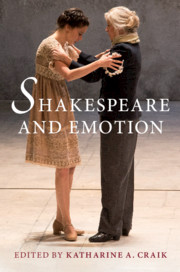71 results
Chapter 8 - Remembering Water in Robert Yarington’s Two Lamentable Tragedies
- from Part III - Affective Memory
-
-
- Book:
- Memory and Affect in Shakespeare's England
- Published online:
- 07 June 2023
- Print publication:
- 27 July 2023, pp 162-180
-
- Chapter
- Export citation
Chapter 36 - Performing Chastity
- from Part IV - Virtuous Performances
-
-
- Book:
- Shakespeare and Virtue
- Published online:
- 19 January 2023
- Print publication:
- 26 January 2023, pp 360-368
-
- Chapter
- Export citation
Note on Text
-
- Book:
- Shakespeare and Emotion
- Published online:
- 01 October 2020
- Print publication:
- 22 October 2020, pp xvi-xvi
-
- Chapter
- Export citation
Figures
-
- Book:
- Shakespeare and Emotion
- Published online:
- 01 October 2020
- Print publication:
- 22 October 2020, pp viii-viii
-
- Chapter
- Export citation
Bibliography
-
- Book:
- Shakespeare and Emotion
- Published online:
- 01 October 2020
- Print publication:
- 22 October 2020, pp 344-370
-
- Chapter
- Export citation
Acknowledgements
-
- Book:
- Shakespeare and Emotion
- Published online:
- 01 October 2020
- Print publication:
- 22 October 2020, pp xv-xv
-
- Chapter
- Export citation
Part II - Emotions
-
- Book:
- Shakespeare and Emotion
- Published online:
- 01 October 2020
- Print publication:
- 22 October 2020, pp 197-343
-
- Chapter
- Export citation
Contributors
-
- Book:
- Shakespeare and Emotion
- Published online:
- 01 October 2020
- Print publication:
- 22 October 2020, pp ix-xiv
-
- Chapter
- Export citation
Contents
-
- Book:
- Shakespeare and Emotion
- Published online:
- 01 October 2020
- Print publication:
- 22 October 2020, pp v-vii
-
- Chapter
- Export citation
Copyright page
-
- Book:
- Shakespeare and Emotion
- Published online:
- 01 October 2020
- Print publication:
- 22 October 2020, pp iv-iv
-
- Chapter
- Export citation
Part I - Contexts
-
- Book:
- Shakespeare and Emotion
- Published online:
- 01 October 2020
- Print publication:
- 22 October 2020, pp 17-196
-
- Chapter
- Export citation
Index
-
- Book:
- Shakespeare and Emotion
- Published online:
- 01 October 2020
- Print publication:
- 22 October 2020, pp 371-384
-
- Chapter
- Export citation
Introduction
-
-
- Book:
- Shakespeare and Emotion
- Published online:
- 01 October 2020
- Print publication:
- 22 October 2020, pp 1-16
-
- Chapter
- Export citation

Shakespeare and Emotion
-
- Published online:
- 01 October 2020
- Print publication:
- 22 October 2020
The Hand on the Shakespearean Stage: Gesture, Touch and the Spectacle of Dismemberment. Farah Karim-Cooper. London: Bloomsbury Arden Shakespeare, 2016. xiv + 310 pp. $35.95.
-
- Journal:
- Renaissance Quarterly / Volume 70 / Issue 4 / Winter 2017
- Published online by Cambridge University Press:
- 20 November 2018, pp. 1662-1664
- Print publication:
- Winter 2017
-
- Article
- Export citation
The Reformation of Emotions in the Age of Shakespeare. Steven Mullaney. Chicago: University of Chicago Press, 2015. x + 232 pp. $35. - The Renaissance of Emotion: Understanding Affect in Shakespeare and His Contemporaries. Richard Meek and Erin Sullivan, eds. Manchester: Manchester University Press, 2015. xii + 276 pp. £70.
-
- Journal:
- Renaissance Quarterly / Volume 69 / Issue 4 / Winter 2016
- Published online by Cambridge University Press:
- 20 November 2018, pp. 1584-1586
- Print publication:
- Winter 2016
-
- Article
- Export citation
Sympathetic Sonnets
-
-
- Book:
- Shakespeare Survey
- Published online:
- 13 October 2016
- Print publication:
- 06 October 2016, pp 313-323
-
- Chapter
- Export citation
Part II - Playhouses
-
- Book:
- Shakespearean Sensations
- Published online:
- 05 February 2013
- Print publication:
- 07 February 2013, pp 83-154
-
- Chapter
- Export citation
Contributors
-
-
- Book:
- Shakespearean Sensations
- Published online:
- 05 February 2013
- Print publication:
- 07 February 2013, pp vii-ix
-
- Chapter
- Export citation
Contents
-
- Book:
- Shakespearean Sensations
- Published online:
- 05 February 2013
- Print publication:
- 07 February 2013, pp v-vi
-
- Chapter
- Export citation



